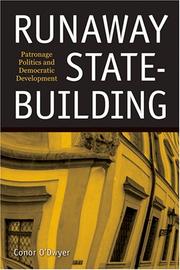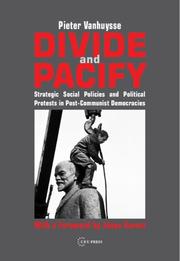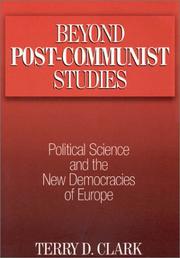| Listing 1 - 8 of 8 |
Sort by
|
Book
ISBN: 1316056759 1316054381 131608275X 1316075656 1316080390 1107279283 1107699754 131607093X 1316078035 1316073297 9781316075654 9781316073292 9781107279285 9781107049987 1107049989 9781107699755 9781316078037 1322176914 Year: 2014 Publisher: Cambridge : Cambridge University Press,
Abstract | Keywords | Export | Availability | Bookmark
 Loading...
Loading...Choose an application
- Reference Manager
- EndNote
- RefWorks (Direct export to RefWorks)
This book theorizes a mechanism underlying regime-change waves, the deliberate efforts of diffusion entrepreneurs to spread a particular regime and regime-change model across state borders. Why do only certain states and non-state actors emerge as such entrepreneurs? Why, how, and how effectively do they support regime change abroad? To answer these questions, the book studies the entrepreneurs behind the third wave of democratization, with a focus on the new eastern European democracies - members of the European Union. The study finds that it is not the strongest democracies nor the democracies trying to ensure their survival in a neighborhood of non-democracies that become the most active diffusion entrepreneurs. It is, instead, the countries where the organizers of the domestic democratic transitions build strong solidarity movements supporting the spread of democracy abroad that do. The book also draws parallels between their activism abroad and their experiences with democratization and democracy assistance at home.
Democratization --- New democracies --- Post-communism --- Countries, Newly democratic --- Democracies, New --- Democratic states, New --- Emerging democracies --- Nations, Newly democratic --- New democratic states --- Newly democratic states --- States, Newly democratic --- Democracy --- Newly independent states --- Democratic consolidation --- Democratic transition --- Political science --- Government policy --- European Union --- E.U. --- Europe, Eastern --- Politics and government --- Europe, Eastern. --- Government --- International.

ISBN: 0801889219 9780801889219 0801883652 9780801883651 Year: 2006 Publisher: Baltimore, Md. : Johns Hopkins University Press,
Abstract | Keywords | Export | Availability | Bookmark
 Loading...
Loading...Choose an application
- Reference Manager
- EndNote
- RefWorks (Direct export to RefWorks)
Nation-building. --- Patronage, Political. --- Bureaucracy. --- Democratization. --- New democracies. --- Stabilization and reconstruction (International relations) --- State-building --- Political development --- Political patronage --- Spoils system --- Civil service reform --- Interorganizational relations --- Political science --- Public administration --- Organizational sociology --- Countries, Newly democratic --- Democracies, New --- Democratic states, New --- Emerging democracies --- Nations, Newly democratic --- New democratic states --- Newly democratic states --- States, Newly democratic --- Democracy --- Democratization --- Newly independent states --- Democratic consolidation --- Democratic transition --- New democracies --- Slovakia --- Czech Republic --- Poland --- Politics and government --- Clientelism, Political --- Patron-client politics --- Political clientelism --- Political sociology

ISBN: 9786155211447 9786155211447 9786155211447 6155211442 1429413379 9781429413374 9789637326790 9637326790 Year: 2006 Publisher: Budapest ; New York : Central European University Press,
Abstract | Keywords | Export | Availability | Bookmark
 Loading...
Loading...Choose an application
- Reference Manager
- EndNote
- RefWorks (Direct export to RefWorks)
Despite dramatic increases in poverty, unemployment, and social inequalities, the Central and Eastern European transitions from communism to market democracy in the 1990s have been remarkably peaceful. This book proposes a new explanation for this unexpected political quiescence. It shows how reforming governments in Poland, Hungary and the Czech Republic have been able to prevent massive waves of strikes and protests by the strategic use of welfare state programs such as pensions and unemployment benefits. Divide and Pacify explains how social policies were used to prevent massive job losses with softening labor market policies, or to split up highly aggrieved groups of workers in precarious jobs by sending some of them onto unemployment benefits and many others onto early retirement and disability pensions. From a narrow economic viewpoint, these policies often appeared to be immensely costly or irresponsibly populist. Yet a more inclusive social-scientific perspective can shed new light on these seemingly irrational policies by pointing to deeper political motives and wider sociological consequences.
Patronage, Political --- New democracies --- Political patronage --- Spoils system --- Civil service reform --- Countries, Newly democratic --- Democracies, New --- Democratic states, New --- Emerging democracies --- Nations, Newly democratic --- New democratic states --- Newly democratic states --- States, Newly democratic --- Democracy --- Democratization --- Newly independent states --- Hungary --- Czech Republic --- Poland --- Europe, Central --- Central Europe --- Politics and government --- Social policy. --- Economic policy, Labor history, Patronage, Political economy, Protests, Sociology, Transition. --- Clientelism, Political --- Patron-client politics --- Political clientelism --- Political sociology
Book
ISBN: 9780511782220 9781107001916 9781107425019 9780511933578 0511933576 0511782225 1107001919 0511853394 9780511853395 1282918826 9781282918825 9786612918827 6612918829 0511932219 9780511932212 0511928343 9780511928345 0511925840 9780511925849 0511930879 9780511930874 110722036X 1107425018 Year: 2011 Publisher: Cambridge : Cambridge University Press,
Abstract | Keywords | Export | Availability | Bookmark
 Loading...
Loading...Choose an application
- Reference Manager
- EndNote
- RefWorks (Direct export to RefWorks)
This study offers an explanation for why advances in women's rights rarely occur in democratizing states. Drawing on deliberative theory, Denise Walsh argues that the leading institutions in the public sphere are highly gendered, meaning women's ability to shape the content of public debate and put pressure on the state to advance their rights is limited. She tests this claim by measuring the openness and inclusiveness of debate conditions in the public sphere during select time periods in Poland, Chile and South Africa. Through a series of structured, focused comparisons, the book confirms the importance of just debate for securing gender justice. The comparisons also reveal that counter publics in the leading institutions in the public sphere are crucial for expanding debate conditions. The book concludes with an analysis of counter publics and suggests an active role for the state in the public sphere.
Women's rights. --- Women --- Democratization. --- New democracies. --- Rights of women --- Women's rights --- Human rights --- Countries, Newly democratic --- Democracies, New --- Democratic states, New --- Emerging democracies --- Nations, Newly democratic --- New democratic states --- Newly democratic states --- States, Newly democratic --- Democracy --- Democratization --- Newly independent states --- Democratic consolidation --- Democratic transition --- Political science --- New democracies --- Women in politics --- Political activity. --- Civil rights --- Law and legislation --- Legal status, laws, etc. --- Social Sciences --- Political Science
Book
ISBN: 9780745644585 9780745644592 0745644589 0745644597 Year: 2013 Publisher: Cambridge Polity
Abstract | Keywords | Export | Availability | Bookmark
 Loading...
Loading...Choose an application
- Reference Manager
- EndNote
- RefWorks (Direct export to RefWorks)
The last quarter of a century has seen an unprecedented wave of democratization around the globe. In these transitions from authoritarian rule to a more democratic order the media have played a key role both by facilitating, but frequently also inhibiting democratic practices to take root. This book provides an accessible and systematic introduction to the media in transitional democracies. It analyses the problems that occur when transforming the media into independent institutions that are able to inform citizens and hold governments to account. The book covers the following topics: - The persistence of political interference - Media markets and political ownership - Defining journalism after regime changes - The role of the media in divided societies - The effectiveness of international media development programmes. The book takes a comparative view by exploring the interplay of political and media transitions in different pathways of democratization that took place in Eastern Europe, Latin America, Africa and Asia. It will be of interest to advanced students and scholars who want a better understanding of the media outside established western democracies. The book will also be of great value to policymakers who are involved in strengthening the media in transitional democracies.
Political systems --- Mass communications --- Mass media --- New democracies. --- Médias --- Nouvelles démocraties --- Political aspects. --- Aspect politique --- New democracies --- Political aspects --- New democracies.Political aspects. --- #SBIB:309H1016 --- cultuurfilosofie --- mediatheorie --- media --- politiek --- nieuwe media --- internet --- pers --- journalistiek --- 130.2 --- Media: socio-culturele aspecten (massamedia en maatschappij, met inbegrip van cultuurhistorische werken en werken over de maatschappelijke en politieke effecten van de (diverse) media) --- Médias --- Nouvelles démocraties --- Countries, Newly democratic --- Democracies, New --- Democratic states, New --- Emerging democracies --- Nations, Newly democratic --- New democratic states --- Newly democratic states --- States, Newly democratic --- Democracy --- Democratization --- Newly independent states --- Communication in politics --- Mass media Political aspects --- Mass media - Political aspects
Book
ISBN: 1438462654 9781438462653 9781438462639 1438462638 Year: 2016 Publisher: Albany
Abstract | Keywords | Export | Availability | Bookmark
 Loading...
Loading...Choose an application
- Reference Manager
- EndNote
- RefWorks (Direct export to RefWorks)
Mainstream theories assert that democracy cures corruption. In market economies, however, elections are expensive and parties, with ever-thinning memberships, cannot legally acquire the necessary campaign funds. In order to secure electoral funds, a large number of politicians misappropriate public funds. Due to the illicit character of these transactions, high officials with conflicts of interest prefer to leave anticorruption enforcement mechanisms unreformed and reserve the right to intervene in the judicial process, with dire consequences for the rule of law. In No Rule of Law, No Democracy, Cristina Nicolescu-Waggonner demonstrates that when corrupt politicians are in power—true of nearly all new democracies—they will protect their office and fail to implement rule of law reforms. Consequently, these polities never reach a point where democracy could and would cure corruption. This dysfunction is tested in one hundred cases over sixteen years with significant results. In the case of the Czech Republic, for example, which is regarded as a consolidated democracy, there is systematic corruption, misappropriation of state funds, an unreformed judiciary, and arbitrary application of law. The only solution is a powerful, independent, well-funded anticorruption agency. Romania, one of the most corrupt countries in Europe, established, at the European Union's request, powerful anticorruption bodies and punished corrupt leaders, which created the predictability of enforcement. It is the certainty of punishment that curtails corruption and establishes true rule of law.
Political corruption --- Political campaigns --- Conflict of interests --- Rule of law --- New democracies --- Supremacy of law --- Administrative law --- Constitutional law --- Conflict of interest --- Conflict of interests (Agency) --- Conflict of interests (Public office) --- Conflicts of interest --- Interests, Conflict of --- Ethics --- Countries, Newly democratic --- Democracies, New --- Democratic states, New --- Emerging democracies --- Nations, Newly democratic --- New democratic states --- Newly democratic states --- States, Newly democratic --- Democracy --- Democratization --- Newly independent states --- Campaigns, Election --- Campaigns, Political --- Election campaigns --- Electioneering --- Electoral politics --- Negative campaigns --- Politics, Practical --- Elections --- Boss rule --- Corruption (in politics) --- Graft in politics --- Malversation --- Political scandals --- Corruption --- Misconduct in office --- Corrupt practices --- Political aspects
Book
ISBN: 1400882982 9781400882984 9780691172149 0691172153 0691172145 9780691172156 Year: 2016 Publisher: Princeton, NJ : Princeton University Press,
Abstract | Keywords | Export | Availability | Bookmark
 Loading...
Loading...Choose an application
- Reference Manager
- EndNote
- RefWorks (Direct export to RefWorks)
From the 1980s through the first decade of the twenty-first century, the spread of democracy across the developing and post-Communist worlds transformed the global political landscape. What drove these changes and what determined whether the emerging democracies would stabilize or revert to authoritarian rule? Dictators and Democrats takes a comprehensive look at the transitions to and from democracy in recent decades. Deploying both statistical and qualitative analysis, Stephen Haggard and Robert Kaufman engage with theories of democratic change and advocate approaches that emphasize political and institutional factors. While inequality has been a prominent explanation for democratic transitions, the authors argue that its role has been limited, and elites as well as masses can drive regime change.Examining seventy-eight cases of democratic transition and twenty-five reversions since 1980, Haggard and Kaufman show how differences in authoritarian regimes and organizational capabilities shape popular protest and elite initiatives in transitions to democracy, and how institutional weaknesses cause some democracies to fail. The determinants of democracy lie in the strength of existing institutions and the public's capacity to engage in collective action. There are multiple routes to democracy, but those growing out of mass mobilization may provide more checks on incumbents than those emerging from intra-elite bargains.Moving beyond well-known beliefs regarding regime changes, Dictators and Democrats explores the conditions under which transitions to democracy are likely to arise.
Dictators --- Democracy --- Tyrants --- History. --- Heads of state --- Authoritarianism --- Democratization --- Democratization. --- New democracies. --- POLITICAL SCIENCE / Political ideologies / Democracy. --- History --- Countries, Newly democratic --- Democracies, New --- Democratic states, New --- Emerging democracies --- Nations, Newly democratic --- New democratic states --- Newly democratic states --- States, Newly democratic --- Newly independent states --- Democratic consolidation --- Democratic transition --- Political science --- New democracies --- Authority --- Since 1965 --- Third Wave. --- authoritarian regimes. --- autocracy. --- backsliding. --- class structure. --- collective action. --- coup. --- coups. --- democracy. --- democratic transitions. --- democratization. --- distributive conflict theories. --- distributive conflict. --- distributive conflicts. --- domestic politics. --- economic aid. --- economic crisis. --- economic development. --- economic performance. --- elite-led transitions. --- elite-reaction reversions. --- elites. --- ethnonationalist organizations. --- inequality. --- institutional strength. --- institutional weakness. --- institutions. --- international factors. --- leverage. --- linkage. --- low-income countries. --- mass mobilization. --- middle-income countries. --- military intervention. --- political entrepreneurs. --- political parties. --- populist reversions. --- praetorianism. --- regime change. --- repression. --- reverters. --- social organizations. --- survivors. --- transition paths. --- transitional elections. --- unions. --- weak democracy.

ISBN: 1315498723 1315498731 1315498715 9781315498720 9781315498713 0765609800 9781315498737 9781315498706 9780765609809 9780765609816 0765609819 Year: 2016 Publisher: Taylor and Francis
Abstract | Keywords | Export | Availability | Bookmark
 Loading...
Loading...Choose an application
- Reference Manager
- EndNote
- RefWorks (Direct export to RefWorks)
New democracies --- Post-communism. --- Political science --- Postcommunism --- World politics --- Communism --- Countries, Newly democratic --- Democracies, New --- Democratic states, New --- Emerging democracies --- Nations, Newly democratic --- New democratic states --- Newly democratic states --- States, Newly democratic --- Democracy --- Democratization --- Newly independent states --- Study and teaching. --- Europe, Eastern --- East Europe --- Eastern Europe --- Politics and government --- Research. --- Post-communism --- Démocratie --- Démocratisation --- Postcommunisme --- Science politique --- Study and teaching --- Etude et enseignement --- Europe de l'Est --- Research --- Politique et gouvernement --- Recherche --- -#SBIB:328H27 --- #SBIB:324H20 --- #SBIB:321H60 --- Democratic consolidation --- Democratic transition --- Self-government --- Equality --- Representative government and representation --- Republics --- Administration --- Civil government --- Commonwealth, The --- Government --- Political theory --- Political thought --- Politics --- Science, Political --- Social sciences --- State, The --- Instellingen en beleid: Midden- en Centraal Europa: algemeen --- Politologie: theorieën (democratie, comparatieve studieën….) --- Westerse politieke en sociale theorieën vanaf de 19e eeuw: socialisme, marxisme, communisme, anarchisme --- -Research. --- -Study and teaching
| Listing 1 - 8 of 8 |
Sort by
|

 Search
Search Feedback
Feedback About
About Help
Help News
News